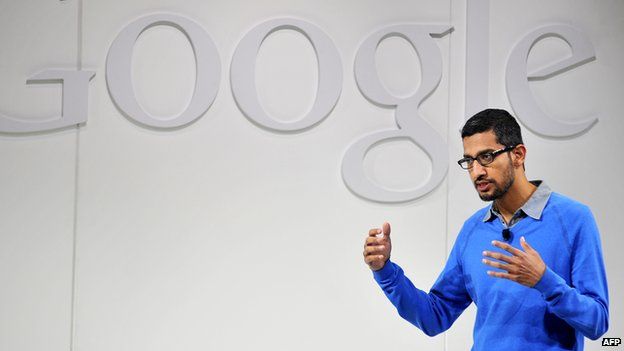
A from-rags-to-riches story
Posted on 08/10/2015 11:14:48 PM PDT by sukhoi-30mki
With Google creating its own parent company, Alphabet, there's a bit of moving about in the Google boardroom. Larry Page is now chief executive of Alphabet. Sergey Brin is its president.
And moving up to be in charge of Google is 43-year-old Sundar Pichai.
Great news for Pichai, and good news too for India - his appointment makes him the latest Indian to earn a massively high-profile job in the US technology industry. Microsoft's Satya Nadella is the other notable example.
Pichai's life story is remarkable, and his rise to the top of Google is a glowing endorsement of India's standing in the global technology industry, and equally, a reassuring reminder of the so-called "American Dream".
Pichai was born and schooled in Chennai, India. He captained his school's cricket team, leading it to win regional competitions.
He studied Metallurgical Engineering at the Indian Institute of Technology in Kharagpur (IIT Kharagpur). According to one of his tutors, quoted in the Times of India, Pichai was the "brightest of his batch".
He has evidently used his talent to great effect at Google, a company he joined in 2004. Products under his watch include Google's web browser, Chrome, as well as the Android mobile operating system.
Android is by far the world's most popular mobile OS - a fact made perhaps more startling by the fact Pichai's family did not possess a telephone until he was 12 years old.
Challenges
According to a profile in Bloomberg magazine, Pichai's upbringing was humble. His family lived in a two room apartment. Pichai didn't have a room - he slept on the living room floor, as did his younger brother.
The family didn't own a television, or a car.
(Excerpt) Read more at bbc.com ...

A from-rags-to-riches story
So which one grows the beard, drinks heavily, and invents the ultimate android?
H1Bs are a huge problem, and Fox News failed to ask advocates for massive H1B increases, like Ted Cruz, to explain why he supports destroying wages in the computer industry. HiTech wages have been stagnant since the late 1990s due to the successful targeting of the industry by Hindu nationalists.
If you read the rest of the story, you find that Pichai’s father worked for the General Electric Company (not the US firm) and dissussed his work with his son even while he was a small boy.
Most Indian families do not have a car. Does a TV help in raising smart kids?
Sundai attended the Indian Institute of Technology, which was designed after MIT, but is smaller, and is extremely selective. His tutors said that he was the brightest of the bunch: that means, the brightest of millions.
Reportedly, he is problem-solver, admired by his fellow workers, and his thinking aligns well with theirs.
This means that the comments about Hindu nationalists, and the poor Americans who can’t compete, are rather off-base. This fellow is a world-class talent, and a practical thinker. One key to having a successful company is to get good people at the top, and not to waste their abilities.
One more thing: Pichai’s father paid attention to him, and talked about work from his youth. How many father’s really give such real-world interests to their young sons? Pichai was a sportsman, and captain of a cricket team. We would consider this rather typical for a young American, except we would be playing football, which is actually not as safe a sport. I am sure that cricket players do not get the brain-destroying conclusions that our young football-players receive.
Actually, cricket can be a deadly sport. I personally know one guy whose b***s got damaged after getting hit by a cricket ball!
And a couple of months ago, an Australian professional cricketer died of brain injuries after getting hit. And cricketers down the talent pool (like Pichai was) are usually at greater risk given the weaker infrastructure on offer.
His tutors said that he was the brightest of the bunch: that means, the brightest of millions.
_______________
According to one of his tutors, quoted in the Times of India, Pichai was the “brightest of his batch”.
________________
In other words brightest of his class which is no more than a few hundred.
Given how difficult it is to get admitted to a college with the Indian Institute of Technology tag, brightest in millions is not an exaggeration.
http://thechoice.blogs.nytimes.com/2011/10/14/indian-admissions/?_r=0
“The Indian Institutes of Technology, which are spread across the country, have an acceptance rate of less than 2 percent — and that is only from a pool of roughly 500,000 who qualify to take the entrance exam, a feat that requires two years of specialized coaching after school.”
Considered.
OF course to be brighter than millions one only has to be in the of the normal curve. Haha
The fact remains: yet another foreigner who does not share my norms, values, or worldview.
I would also point out that perhaps many (most?) US born whites at Google don't share our values or worldviews either...
Chrome aint all that..
Good Luck, alphabet soup.
I had first-hand experience working with Indian H1Bs. They were kind, interested, and knowledgeable to varying degrees; however, the cultural distinctions of language and reasoning totally offset any economic value. Communication not normally complicated became complicated.
Disclaimer: Opinions posted on Free Republic are those of the individual posters and do not necessarily represent the opinion of Free Republic or its management. All materials posted herein are protected by copyright law and the exemption for fair use of copyrighted works.